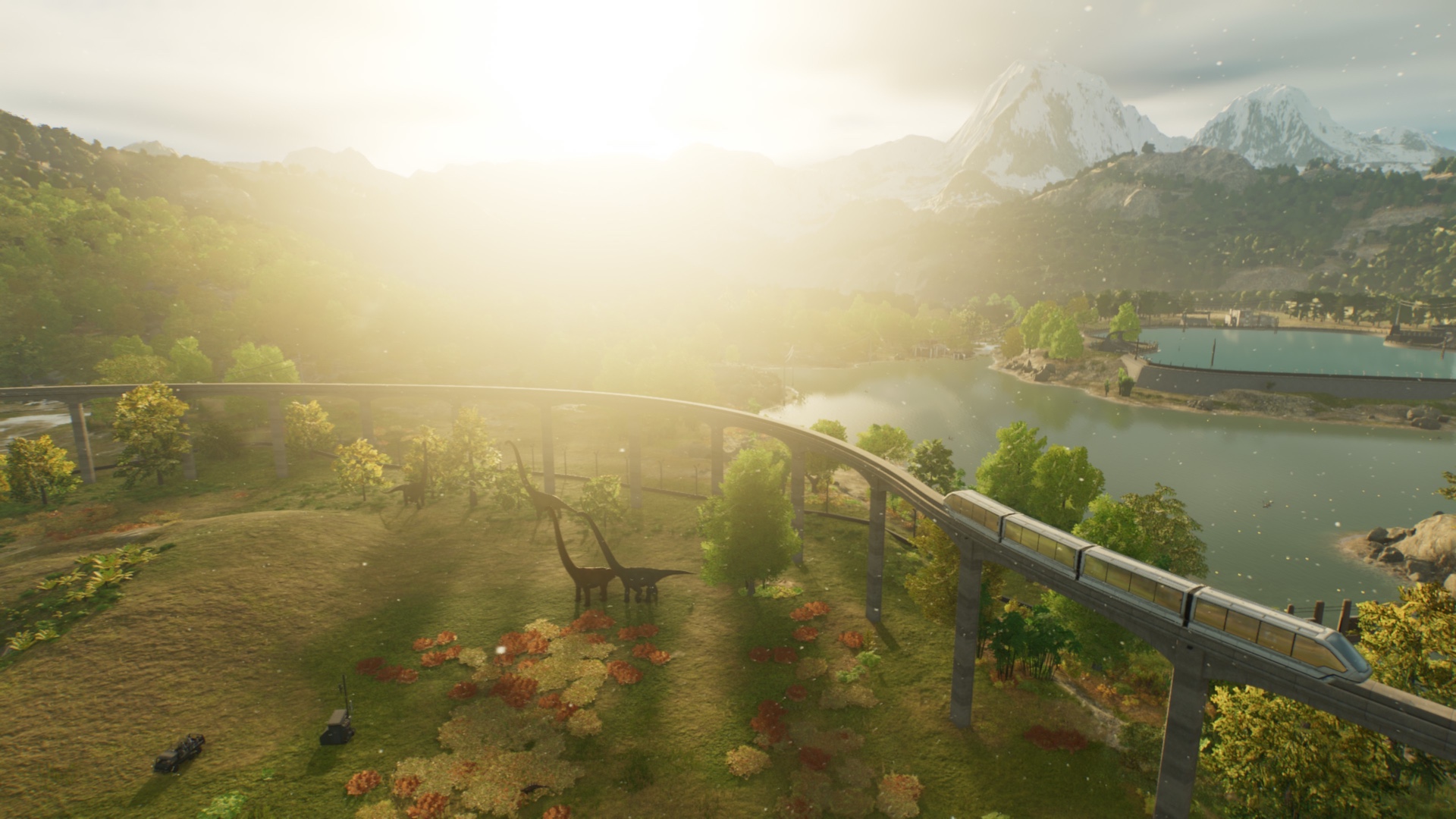TechRadar Verdict
Jurassic World Evolution 3 is a behemoth park management sim. It offers an engaging campaign, the opportunity to revive, breed, and genetically upgrade dinosaurs, and the ability to build your own scenery from scratch. But I’d still like more scope to flex my creative muscles, and certain mechanics like managing dinosaurs’ comfort become a bit of a chore. A satisfying evolution, but it’ll require some tweaks to become truly great.
Pros
- +
Innovative campaign
- +
Crammed with things to do
- +
Adds ability to make custom buildings
- +
Dinosaurs look great…
Cons
- -
… But parks can still look a bit flat
- -
Satisfying dinosaur needs is sometimes tedious
- -
Still offers less creative potential than Planet Zoo
Why you can trust TechRadar
Platform reviewed: PC
Available on: PS5, Xbox Series X, Series S, PC
Release date: October 21, 2025
Jurassic World Evolution 3 is a beast of a management simulation game that allows you to manage your own prehistoric park. It’s by far the most creative entry in the series so far, offering you the ability to create your own buildings and scenery from scratch for the first time. The challenge mode, sandbox mode, and innovative campaign are crammed full of things to research and create, not to mention 70 different dinosaur species. But Jurassic World Evolution 3 also sometimes gets in its own way with systems that distract from, rather than deepen, your core objectives.
I should probably mention that I’m a bit of a park management games addict, particularly those developed by Frontier Games. Not only did I write our Planet Coaster 2 review, but I’ve poured a truly disgusting amount of time into some of their other games. My current play time on Planet Zoo totals 1,100 hours – or six and a half weeks solid – so even though I’m new to the Jurassic World Evolution franchise, I’ve invested probably more of my life in park sim games than is entirely good for me.
While Jurassic World Evolution 3 might not offer quite the same absurd open sandbox experience of its sister titles, it does offer far more satisfying and comprehensive management, bringing it far more in line with some of the best simulation games. I could always take or leave park management in the Planet Coaster and Planet Zoo games – which is why I often switched it off entirely. But in Jurassic World Evolution 3, management is much more in its genes.
At the heart of Evolution 3, there’s a really tight management loop. You hire scientists, send them on expeditions to harvest fossils, use them to extract the juicy dino DNA contained within, and then set them to work synthesizing any of the 70 species included in the game. You can then peruse the traits of the eggs this creates and decide which ones to hatch before incubating and releasing them into your chosen exhibit.
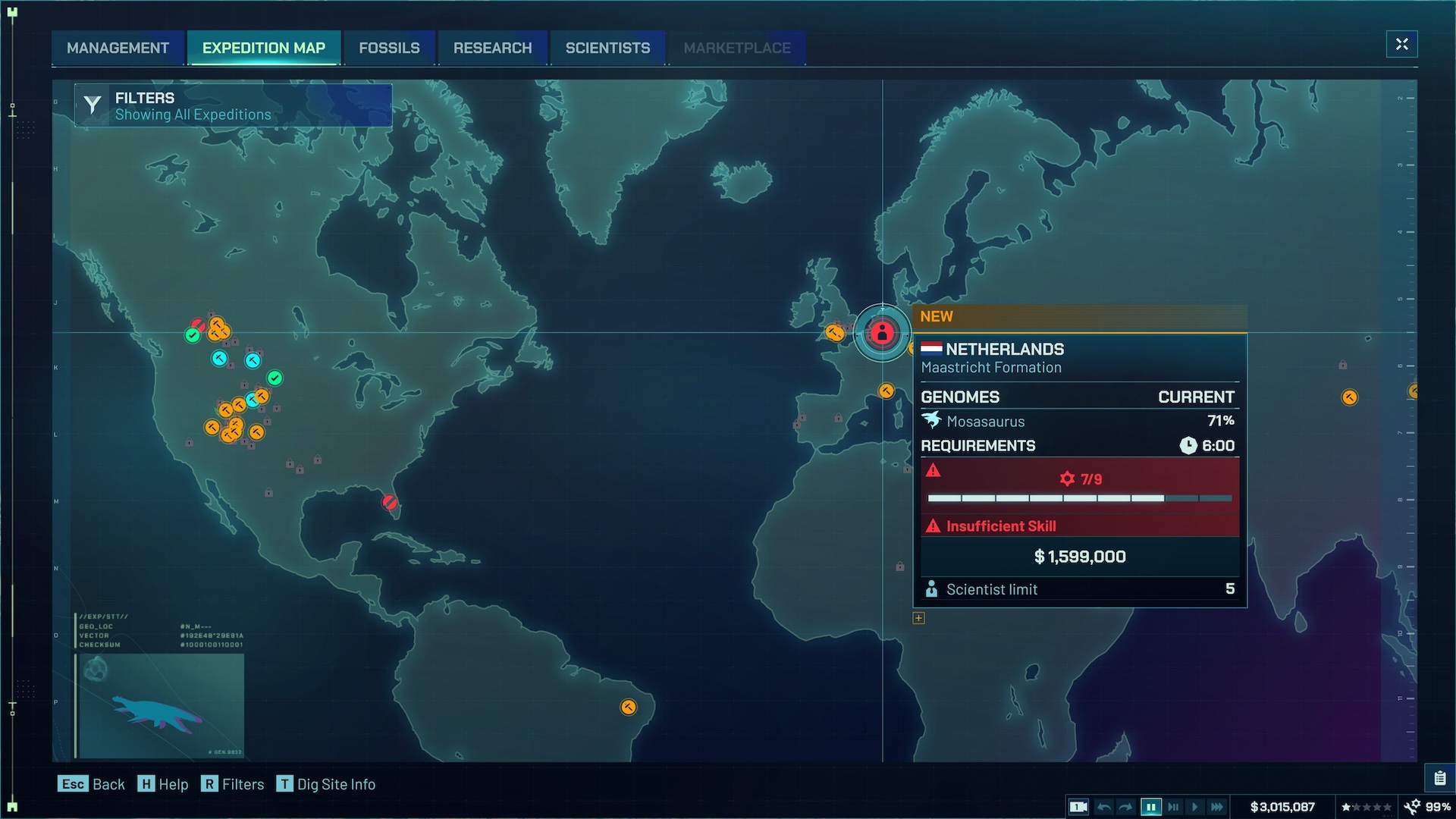
Naturally, though, this is only half of the experience. Keen though the game is to stress that you’re running a sanctuary for all these saurians, they sure look a lot like zoos, and, as with any zoo, you have commercial considerations to take into account. You’ll create viewing galleries to allow your guests to spy on your cretaceous critters, tours to get them up close and personal, and amenities to make a fast buck keep them fed and watered.
Simple as this sounds, there’s way more layered on top of this. There’s dinosaur breeding to manage, research to conduct, and diseases to diagnose and treat. And unless you’re quick to tranquilize and return any carnivorous dinosaurs that break out to their pens, they’ll scarf down your guests – bringing a whole new meaning to the term ‘paleo diet’.
But it wouldn’t be Jurassic World if you couldn’t conduct crazy experiments that cross a line man was not meant to cross. Before synthesizing species of dinosaurs, you can tinker around with their DNA, adding traits that modify their appetite and thirst, ups their resilience, improve their sociability, or even improve their combat potential. And if that’s too vanilla for you, you can also research awful genetic chimeras, including the Indominus Rex, Indoraptor, and Spinoceratops.
Sign up for breaking news, reviews, opinion, top tech deals, and more.
On the campaign tail
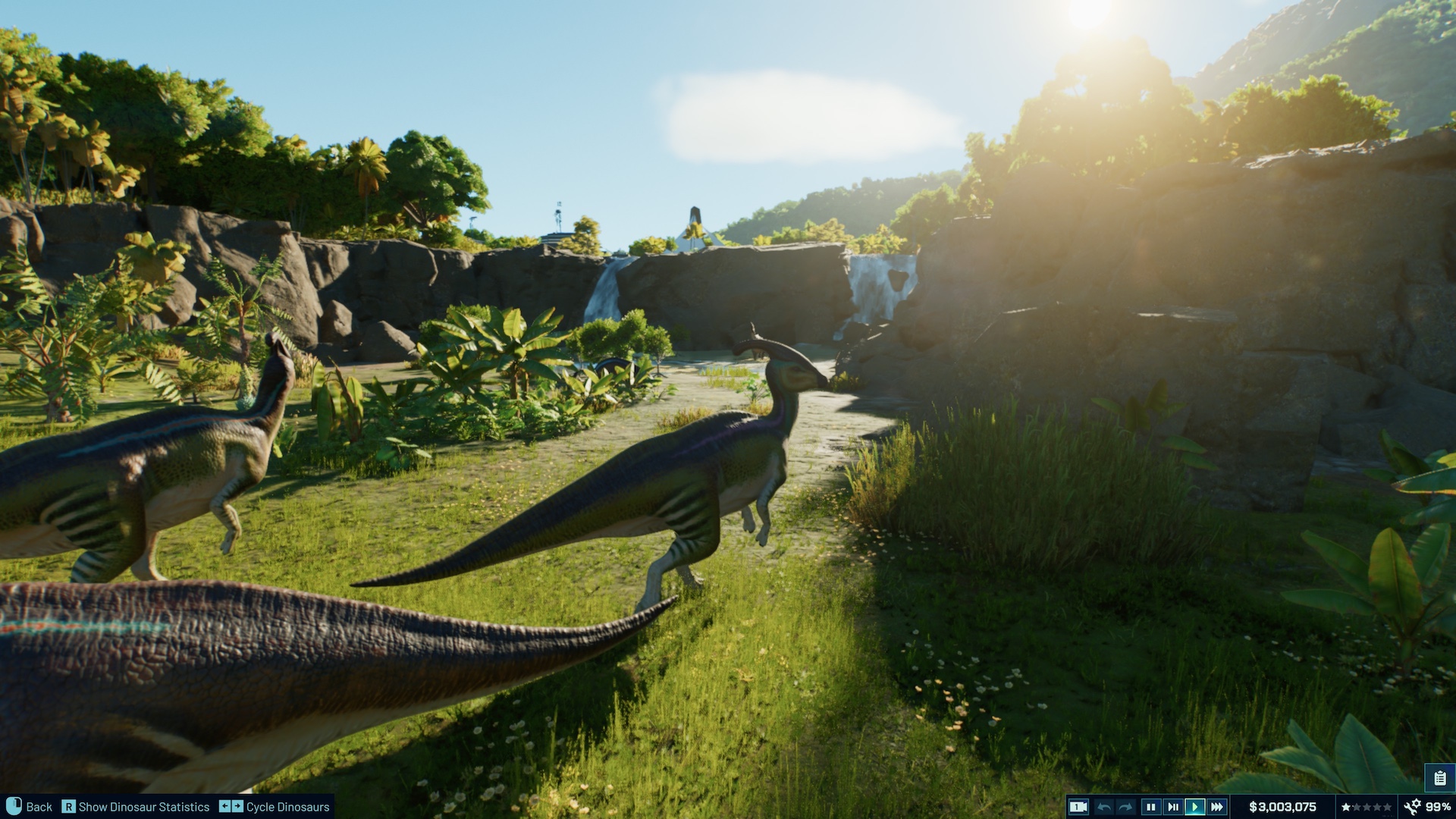
In fact, there are so many mechanics at play, I was glad the Campaign was there to hold my hand. It’s the first time I’ve found the Campaign mode of a management sim game to genuinely be unmissable, rather than something I can just dip my toes in. And there’s certainly plenty to get your teeth into here.
After the events of the Jurassic World franchise, you’re leading the Dinosaur Integration Network (DIN), an organisation dedicated to helping dinosaurs coexist alongside humanity. Conveniently, keeping the public safe from vicious man-eaters and helping endangered dinosaurs breed looks a lot like running a certain Jurassic-themed park, so you won’t find much of a tonal shift here.
While the campaign is structured across a series of parks around the world, you’ll work across them concurrently – although you’ll be moved on to new locations as you complete story objectives, as your international reputation improves, further objectives are unlocked in maps you’ve already visited. This feels far more dynamic an incentive to return to former parks than just improving a star rating: I genuinely felt like I was running a global network of sanctuaries that each impact one another, rather than just visiting isolated maps that I was done with the second I moved on to the next one.
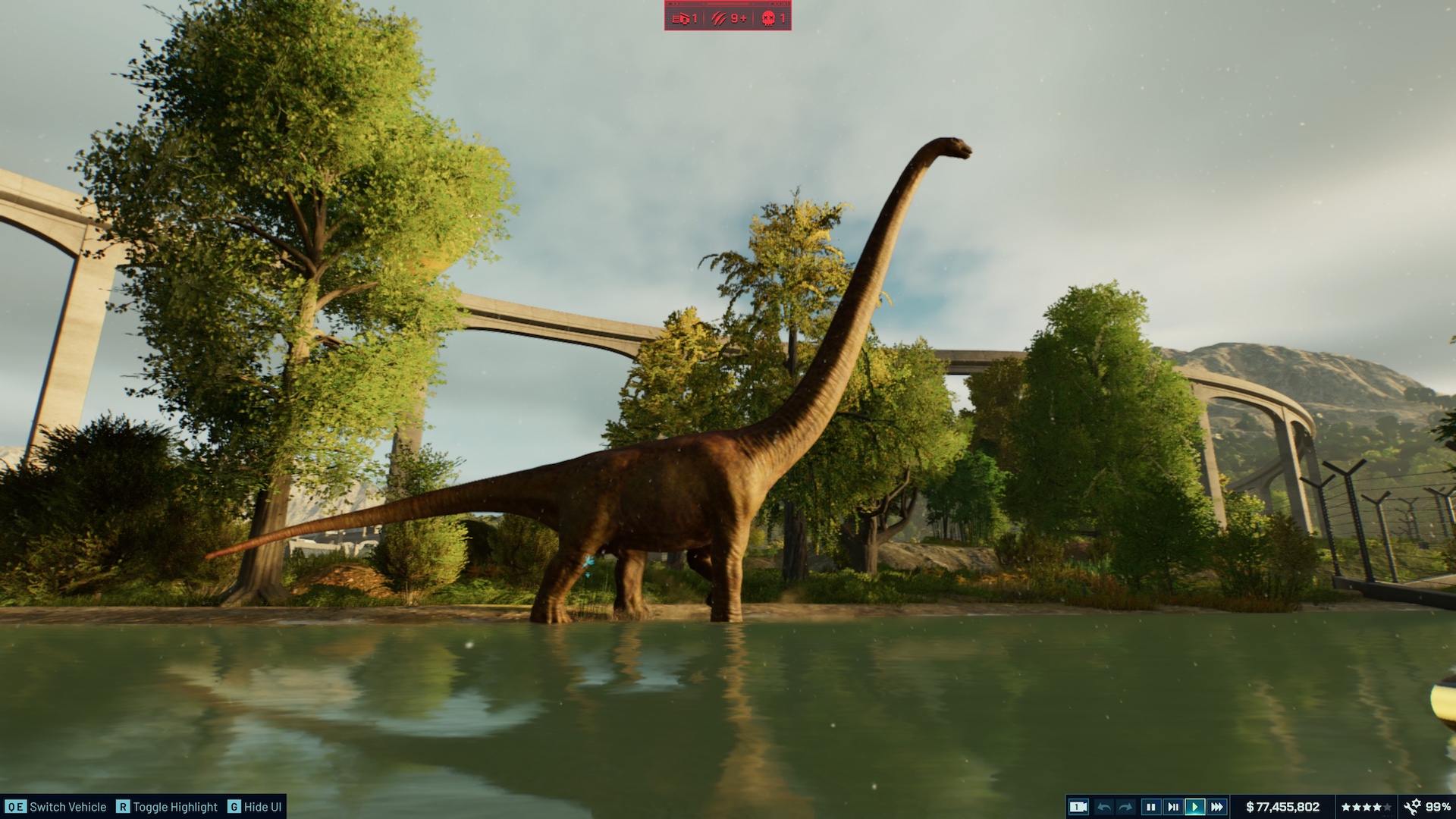
The voice acting is generally excellent. Jeff Goldblum is fantastic as always as Ian Malcolm, even if his lines largely are just arch variations on: ‘Welp, here we go again!’ And while I wouldn’t say the story throws that many curveballs, there are just enough elements like interfering corporate interests and human-supremacist saboteurs to add some bumps in the road.
Should you want a more focused test of your skills, Challenge mode provides a variety of scenarios for you to tackle. From containing vicious carnivores with limited fencing to pacifying grouchy giants without tweaking their genome, I found there was a decent variety of trials to help me flex my management muscles.
Jurassic Parks & Recreation
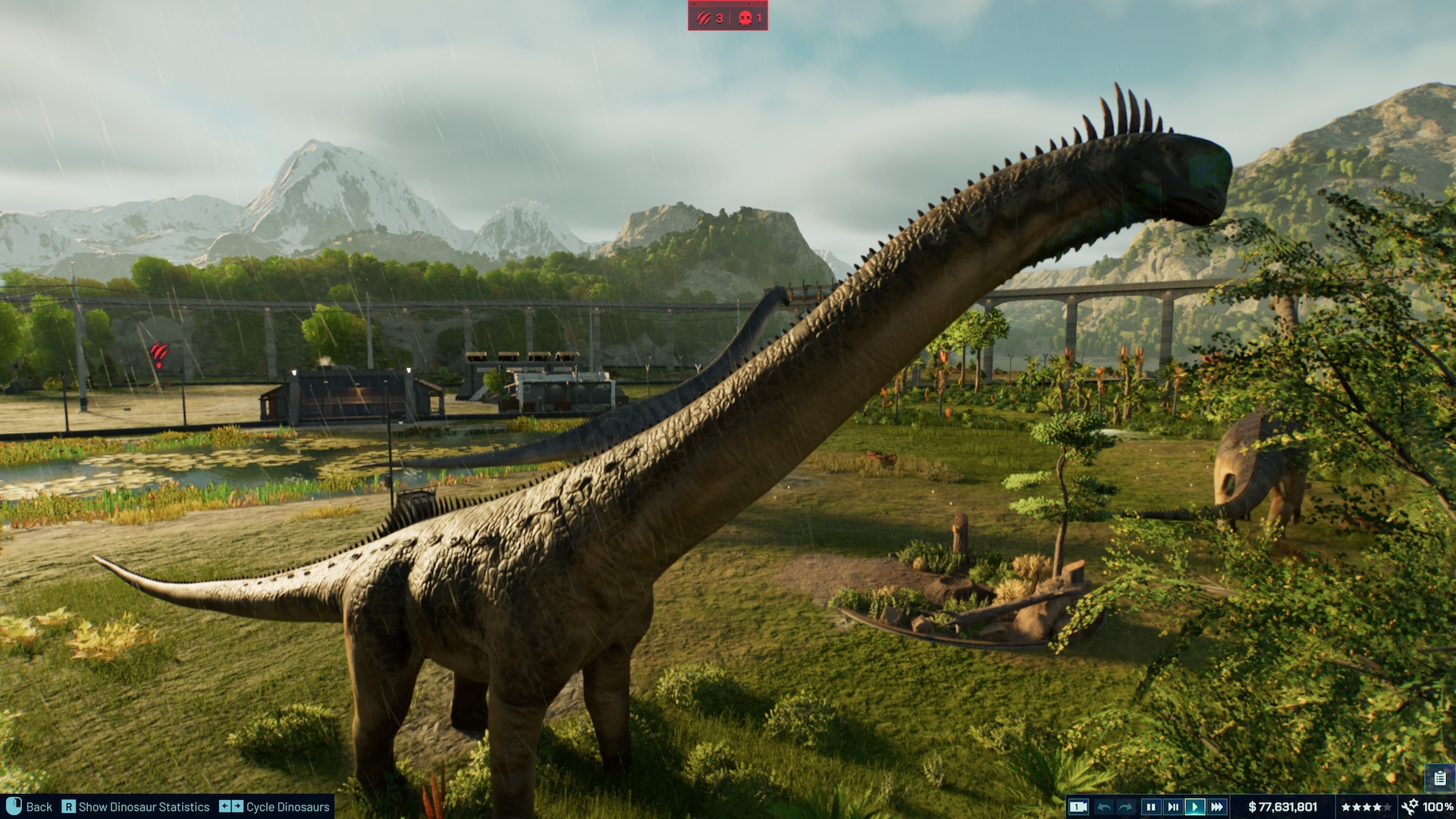
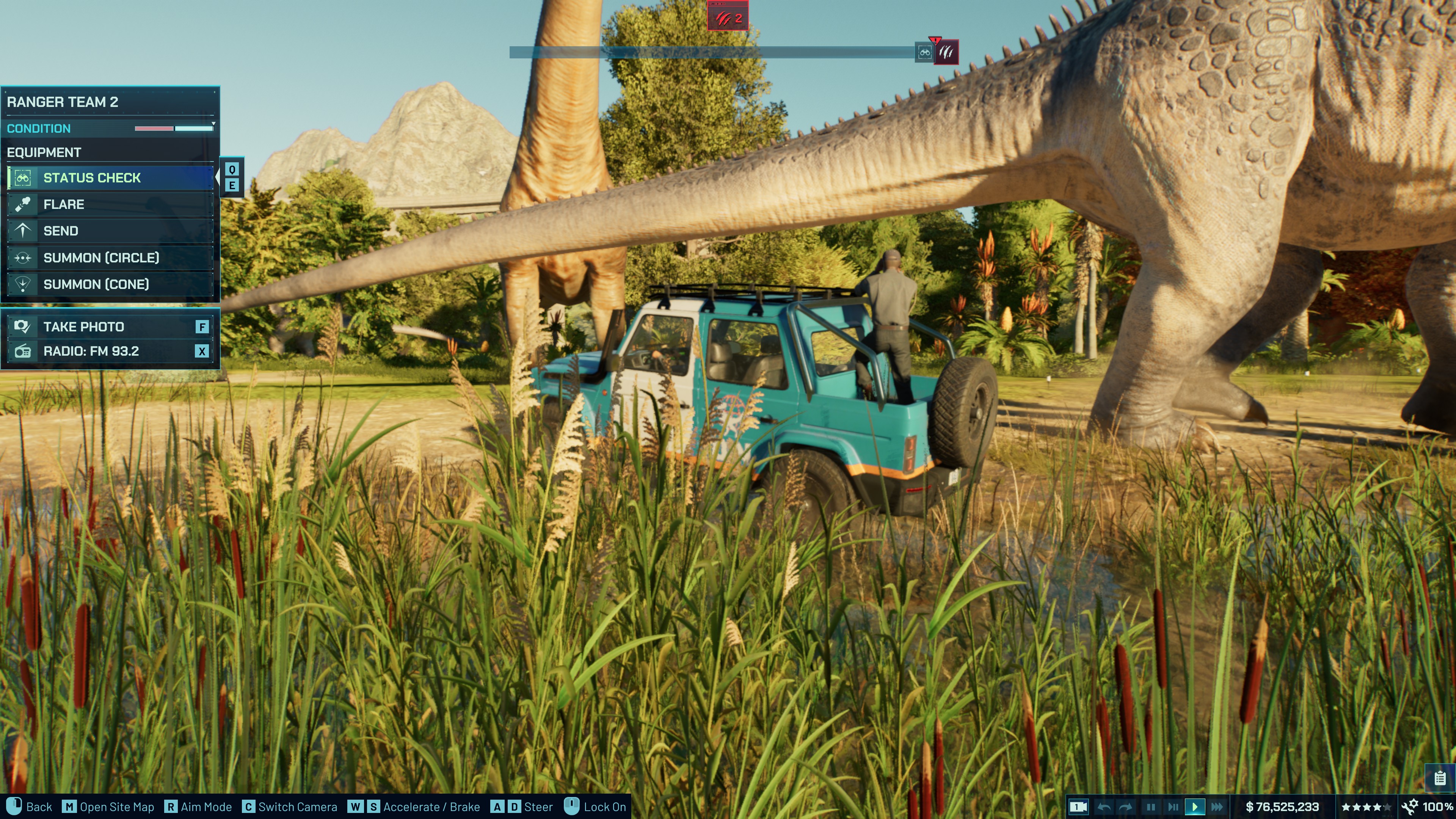
Zipping around in vehicles to vaccinate velociraptors, snap photos of protoceratops, or tranq raging tyrannosaurs never ceases to amuse me. Yes, you can automate this, but why would you let your artificial park employees have all the fun? Come on: let’s hop in this chopper and chase after some plodding sauropods.
Not everything in Jurassic World Evolution 3 is quite so high-stakes. There’s always the option to just kick back and enjoy the fun of creating your perfect park, whether in the campaign missions or in the dedicated sandbox mode. And this is where the game really shines: designing your dream habitats and getting up close and personal with the prehistoric beasts in them.
Part of the reason for this is that the creatures themselves are exquisite. Generally speaking, I found the graphics in Jurassic World Evolution 3 to be good, if unexceptional. On Ultra settings, the game ran at a smooth 60 fps on our Acer Predator Helios 300 laptop with an Nvidia GeForce RTX 3080 GPU, but from a bird's eye view, it was pretty, but didn’t necessarily blow me away in the way I expected.
However, once you get down to the level where you’re face-to-face with your dinosaurs, the 3D models are beautifully detailed and animated, while raytracing gives lighting effects and shadows a literal glow up. At one point, I watched some sauropods wading across the shallows in front of a guest’s canoe, and the way they were silhouetted against the sun was spectacular. I just wish my parks had quite the same pop when viewed from an overhead perspective.
Fortunately, there are plenty of excuses to immerse yourself in your parks. You view everything from your guests’ perspectives, whether that’s viewing their perspective from ride cameras or walking around in the in-game Google Street View. But, on top of this, you can take the wheel of every vehicle in your park to deliver meds to your dinosaurs or mend fences when the inevitable happens and there’s a breakout.
There’s also the opportunity to channel your inner architect and create your own scenery. Frontier’s games have always been creatively anarchic: you have complete freedom to design whatever you want to decorate your parks and zoos, but the tools at your disposal were frequently chaotic, often requiring all kinds of botches and hard work to make bespoke scenery that looked truly organic.
Up until now, Jurassic World Evolution has been the exception to this rule, limiting you to prefabricated buildings and scenery items.
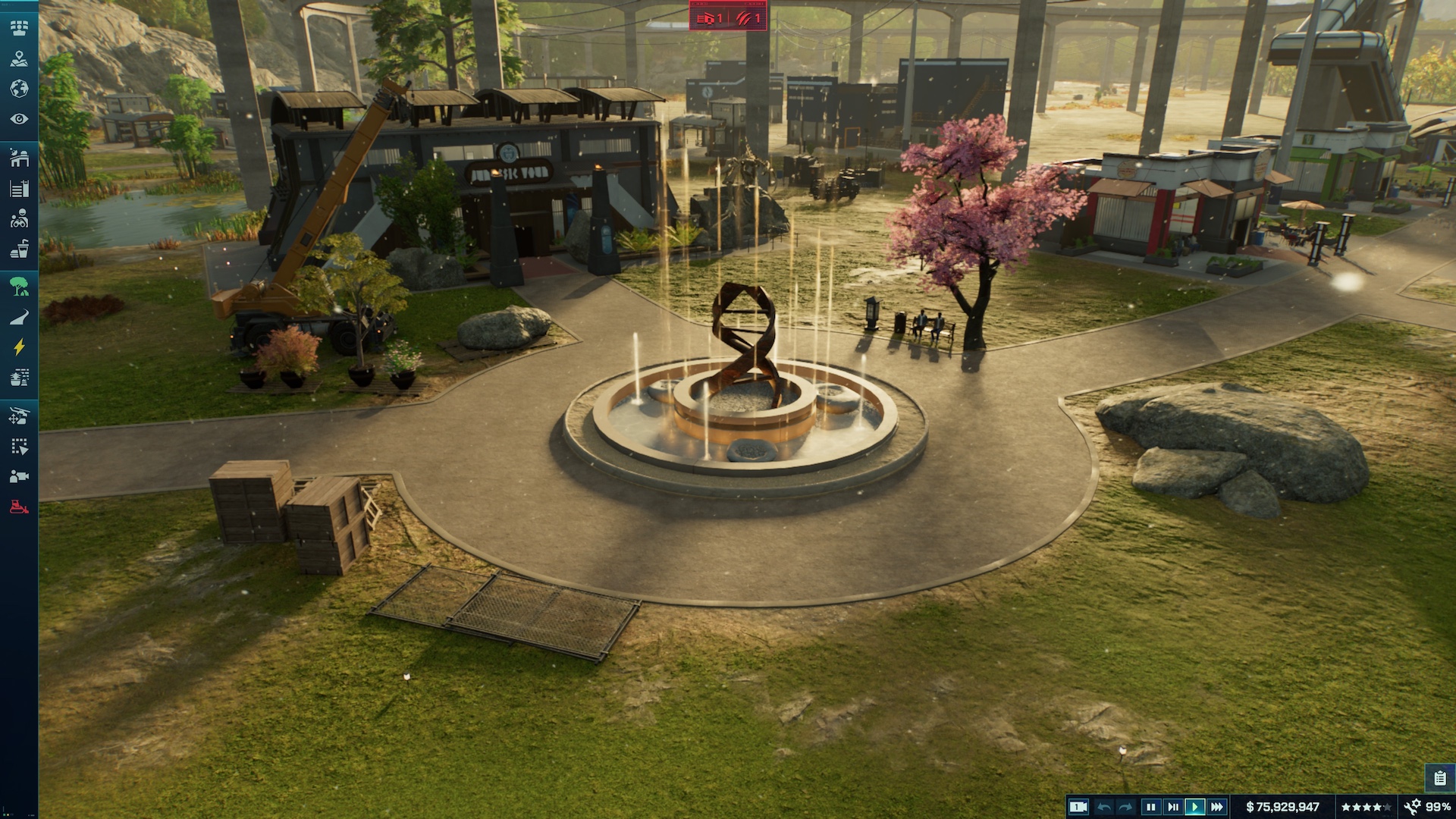
Well, not anymore. In Jurassic World Evolution 3, Frontier has added the ability to create your own amenities and decorations from scratch, adding an enormous toybox of scenery parts for you to play with. From rock formations and fossils to gantries and girders, it enabled me to build up my own blueprints piece by piece, including aquatic coral reefs and a slightly wonky fountain centerpiece.
But while Jurassic World Evolution 3 has been learning elements from other games in Frontier’s fold, it’s also been refining them.
Path-placing mechanics are far more intelligent – I was able to quickly lay out straight routes and curving arcs simply by placing my cursor where I wanted it to go, rather than messing around with path angles. The part-scaling that was introduced in Planet Coaster 2 has been expanded here, allowing me to tweak the size of almost any model to achieve much more variety in my scenery design. And plants are now fully animated, swaying in the breeze and bending double during storms, making them feel far more alive.
In my opinion, there’s even more Jurassic World Evolution 3 could learn from its sister titles, though. Enclosures still aren’t as flexible as in Planet Zoo – guests really only interact with dinosaurs from set-pieces rather than marvelling over them from every viewpoint, and creature path-finding isn’t as sophisticated, making multi-height habitats impossible. And there’s no way to create raised paths, which makes multistory buildings and bridges over enclosures impossible, so maps are by necessity much flatter than I’d like. I’m not quite as free as I’d like to create sprawling, hyperrealistic dino parks, and that’s a shame.
Micromanageasaurus
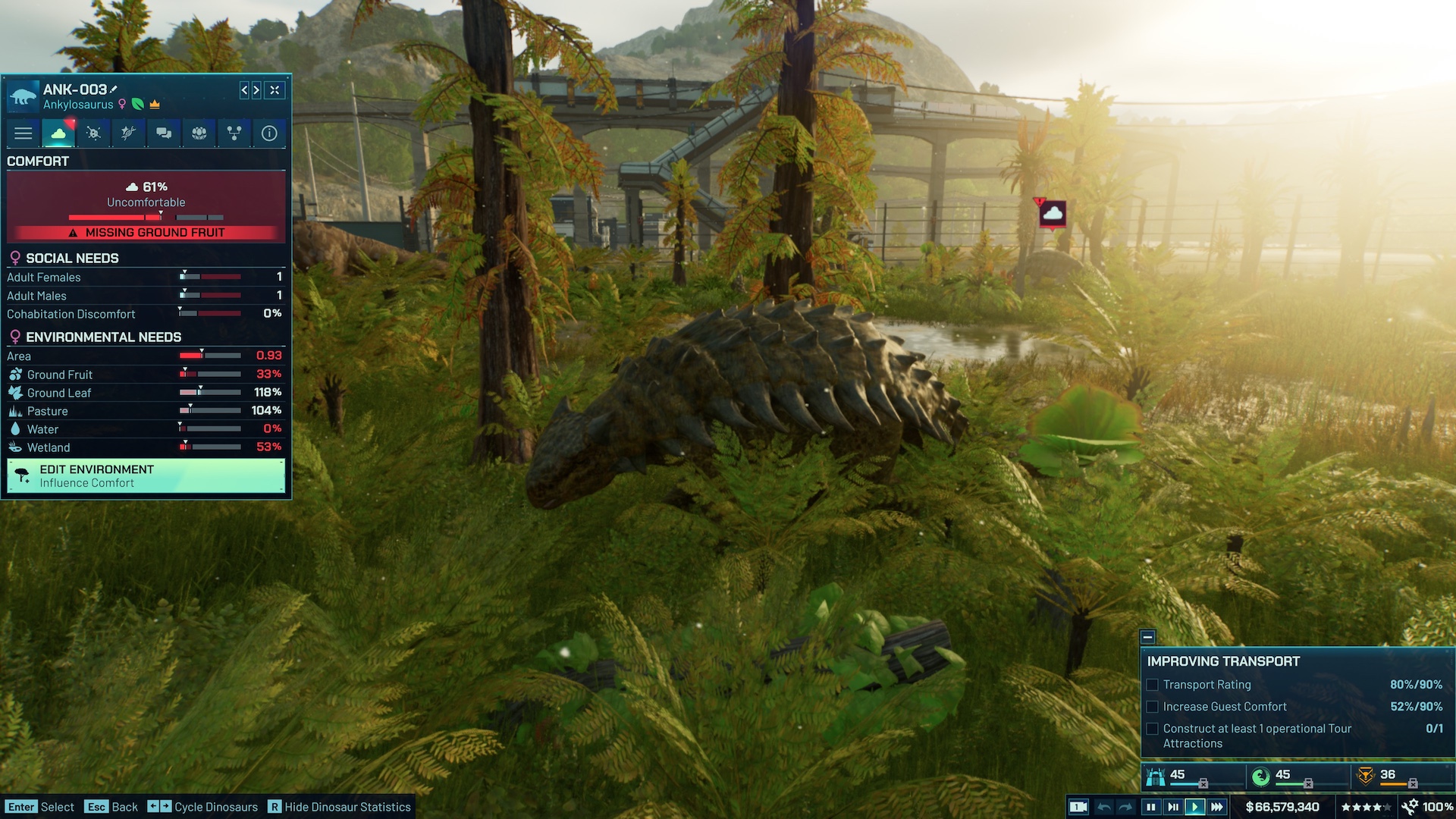
Fundamentally, there’s a reason for this more restrictive gameplay. Unlike some of its sister titles, Jurassic World Evolution 3 is a management sim first and a creative sandbox second. And while this often works to its favour, there are points in the campaign where I started to find its mechanics became as gargantuan and unwieldy as the genetic revenants I was managing.
Regularly, while playing Jurassic World Evolution 3, I’d have to drop what I was doing because my prehistoric pets weren’t happy with the flora on offer in their exhibits. With a single species of dinosaur in an enclosure, this is trivial to satisfy – you quickly paint in different kinds of cover, water, fiber, nuts, and fruit until the sliders representing their preferences are satisfied.
But add multiple species to a single exhibit – something that is not only encouraged but mandatory in some scenarios – and requirements quickly conflict. For example, my Apatosaurs love tall leafy plants and pasture, while my Lokiceratops, Houdini, wouldn’t stop perennially trying to break out of her prison until I’d provided ground fiber and a wetland. And this is all exacerbated by the fact that juvenile dinosaurs have different requirements from adults, meaning exhibiting even just two species together means you’ll often have four radically opposed needs to meet.
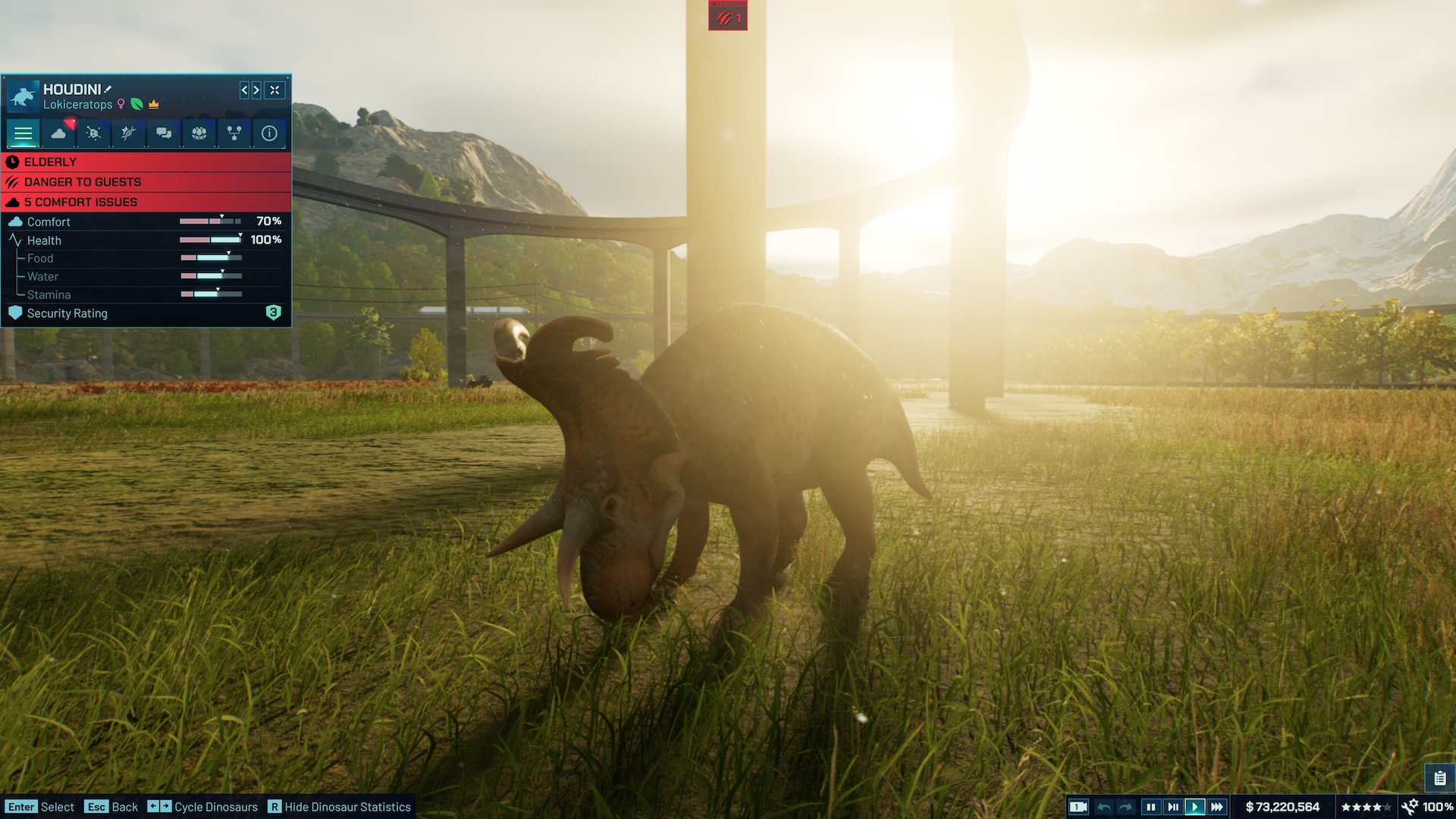
Satisfying conflicting needs is a zero-sum game: painting in one removes another, and, as you seemingly can’t pin two different dinosaurs’ needs on screen at once, you’ll often come away happy that you’ve pleased one cretaceous critter only to discover the other is now sulking over the lack of swamps.
Even once you’ve reached an equilibrium, laying tours through exhibits will carve swathes through the undergrowth, meaning you need to repaint it all over again. Ultimately, I’d regularly find myself having to expand exhibit sizes after the fact, moving all my guest facilities in the process, just to ensure I could satisfy competing demands that were now impossible to meet within the existing space.
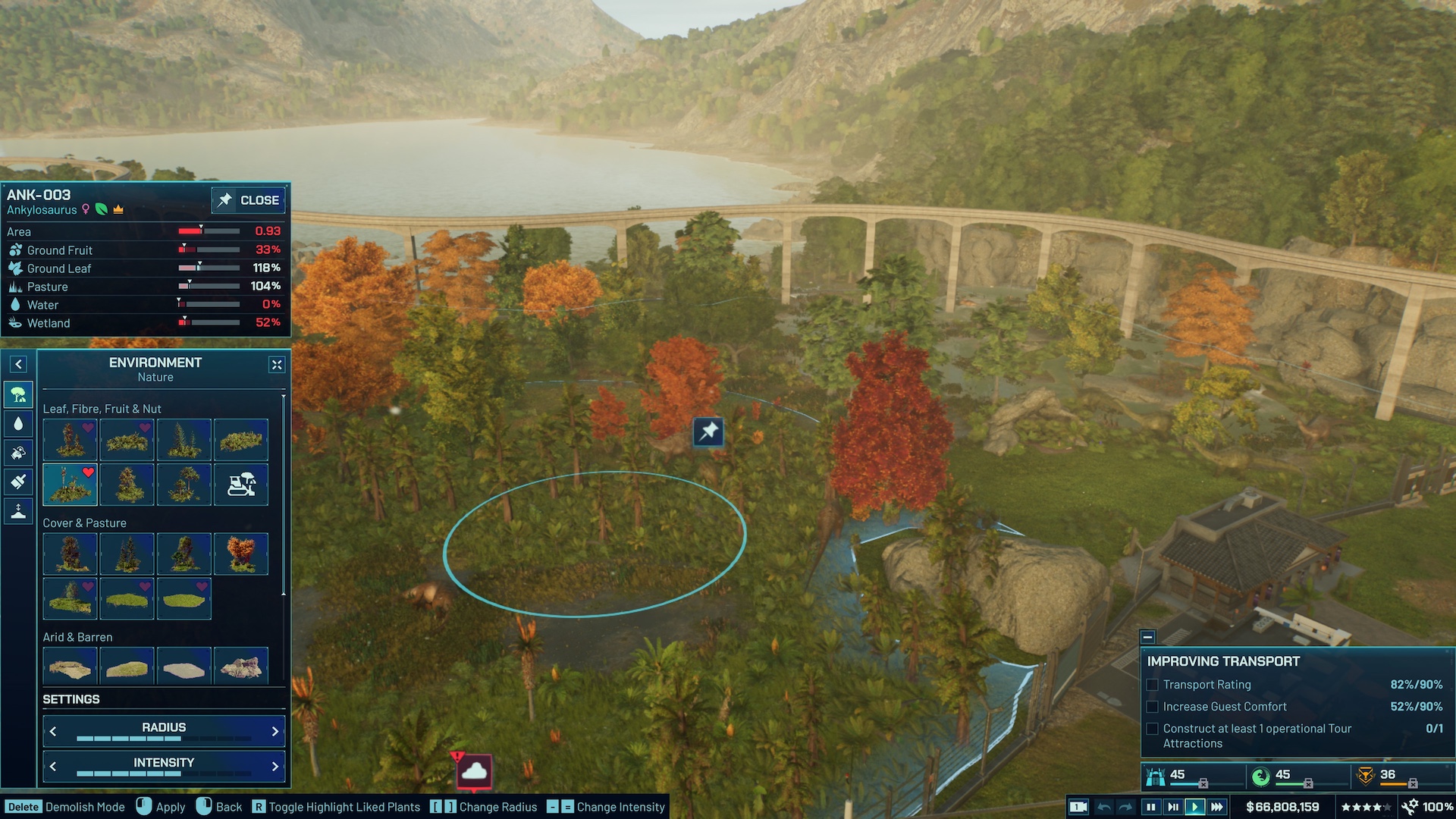
Now, I’ll readily acknowledge the game has mechanisms to ameliorate some of these issues. Once you have unlocked enough dinosaur species, you can select pairings that align better with their requirements. And tweaking Houdini’s genome could have allowed me to make her more relaxed about her environmental requirements. However, these are tools you’ll only research later in a map playthrough, and in the interim, you’re left with a bunch of busywork that commits the cardinal sin in a management game: it’s just not that fun.
This is a real shame because many other tasks in the game are a real blast, and I loved releasing new monsters into my exhibits or building unique scenery. But if I’m going to be pulled away from these enjoyable tasks to fight fires, the mechanics should support me in dousing them permanently, not reignite the same one the second my back is turned.
Should you play Jurassic World Evolution 3?
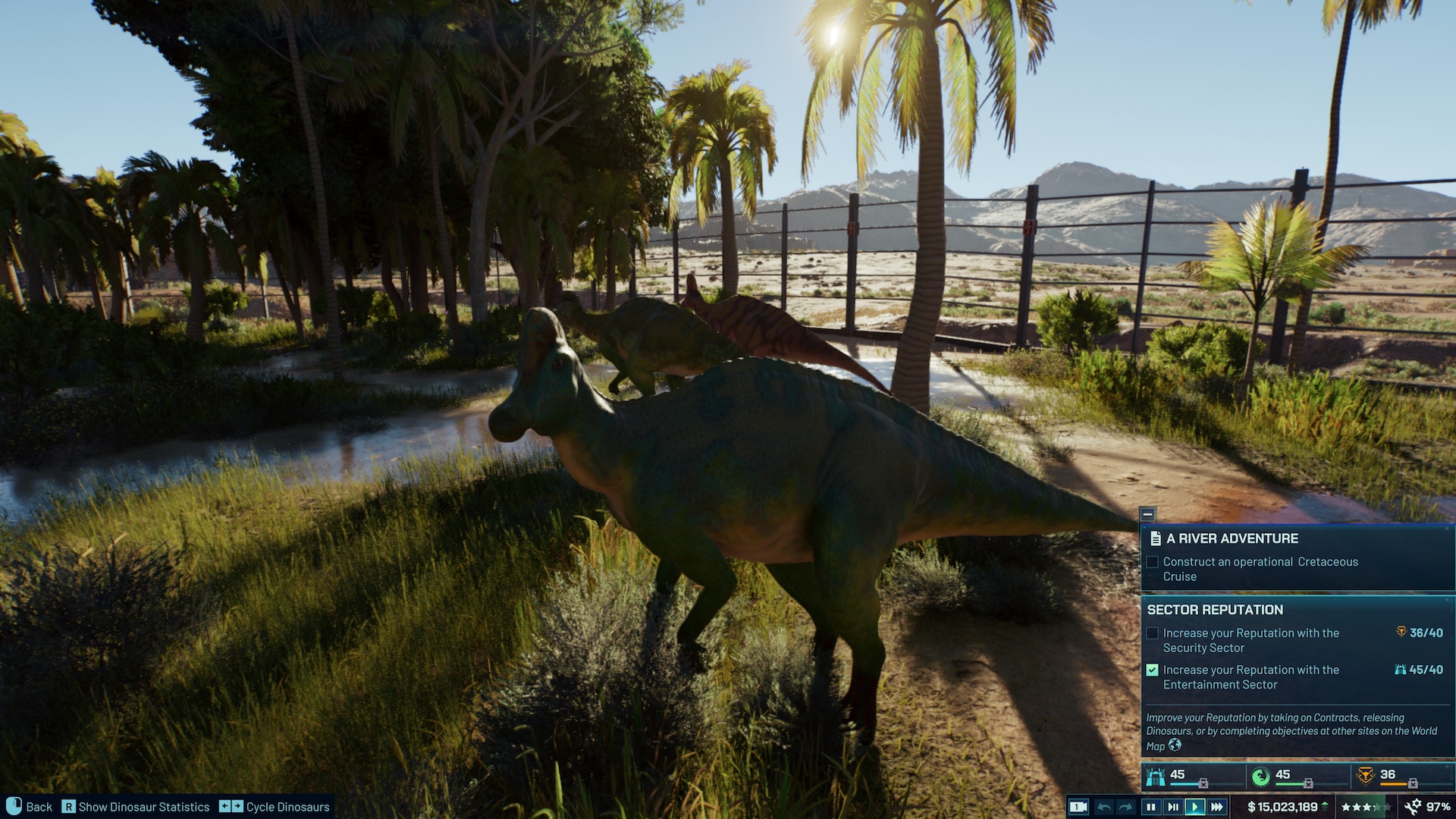
Play it if…
You want an innovatively designed campaign
I love the way Jurassic World Evolution 3’s main campaign plays out as a series of concurrent maps that have further objectives unlocked as your reputation grows. It gives a much better reason to revisit older maps and makes it feel like a true international network of parks.
You like having a lot on your plate
Whether you’re managing expeditions, building exhibits, breeding dinosaurs, or trying to research monstrous genetic chimeras, there’s an almost dizzying amount you can do in this game.
You’re a Jurassic Park super-fan
From Jeff Goldblum’s sardonic quips to the various movie-mimicking designs, there are a lot of elements here that will give you that nostalgic buzz. If you don’t mutter ‘clever girl’ the first time your velociraptor busts out of its enclosure, you have far more self-control than I do.
Don’t play it if…
Micromanagement makes you Tyrannosaurus vexed
Everything you do in this game takes time to complete, while dinosaur needs are difficult to balance and feel a bit thankless at times. If you’re not a fan of having to wait for timers to count down or repeatedly tweaking things to balance sliders, you might want to give it a miss.
You just want Planet Zoo, but dinosaurs
Fundamentally, Jurassic World Evolution 3 is a management game and doesn’t offer as smart creature simulation as a game like Planet Zoo. If you just want to build a wholesome zoo packed with cute dinosaur interactions, it may not be for you.
You want a limitless creative sandbox
The new building elements Frontier has added here have definitely added some much-needed creativity. But you still may not find it offers quite the same creative freedom as some of the developer’s other games, so bear that in mind.
Accessibility
Jurassic World Evolution 3 has a good range of accessibility options. You can tweak the colors of both the UI and management views for Deuteranopia, Protonopia, Tritanopia, and high contrast. You can also switch on highlight mode for dinosaurs, tweak the highlight color according to these same profiles, and set the highlight distance.
On top of this, you can tweak the size and opacity of subtitles, set different colors for different speakers, and increase the scale of the HUD. There are also options to disable certain effects, allowing you to switch off camera shaking and flashing effects.
How I reviewed Jurassic World Evolution 3
I played Jurassic World Evolution 3 over the course of two weeks. Not only did I play my way through the campaign, but I also experimented with building my own park from scratch in Sandbox mode and explored the challenges available.
I reviewed the PC version, but I also tried it out on multiple platforms, including our Acer Predator Helios 300 gaming laptop and on my Steam Deck, to see how it fared on multiple devices. I also played it using a keyboard and mouse and using a PowerA Moga XP-Ultra multi-platform wireless controller to test out various control modes.
In terms of experience, not only have I been reviewing gaming hardware for around five years, but I've spent my whole life playing simulation games, dating right back to Theme Park on the PC. I've also played many of Frontier Developments' games to date, having played Planet Coaster and Planet Coaster 2 and clocked up a ridiculous 1,100 hours in Planet Zoo.
First reviewed: October 2025

Josh is Reviews Editor at TechRadar. With over ten years of experience covering tech both in print and online, he’s served as editor of T3 and net magazines and written about everything from groundbreaking gadgets to innovative Silicon Valley startups. He’s an expert in a wide range of products from Spatial Audio headphones to gaming handhelds. When he’s not putting trailblazing tech through its paces, he can be found making melodic techno or seeking out the perfect cold brew coffee.
You must confirm your public display name before commenting
Please logout and then login again, you will then be prompted to enter your display name.
